2017届高考英语专题复习-动词及动词短语
文档属性
| 名称 | 2017届高考英语专题复习-动词及动词短语 |  | |
| 格式 | zip | ||
| 文件大小 | 310.7KB | ||
| 资源类型 | 教案 | ||
| 版本资源 | 通用版 | ||
| 科目 | 英语 | ||
| 更新时间 | 2016-12-25 21:33:50 | ||
图片预览

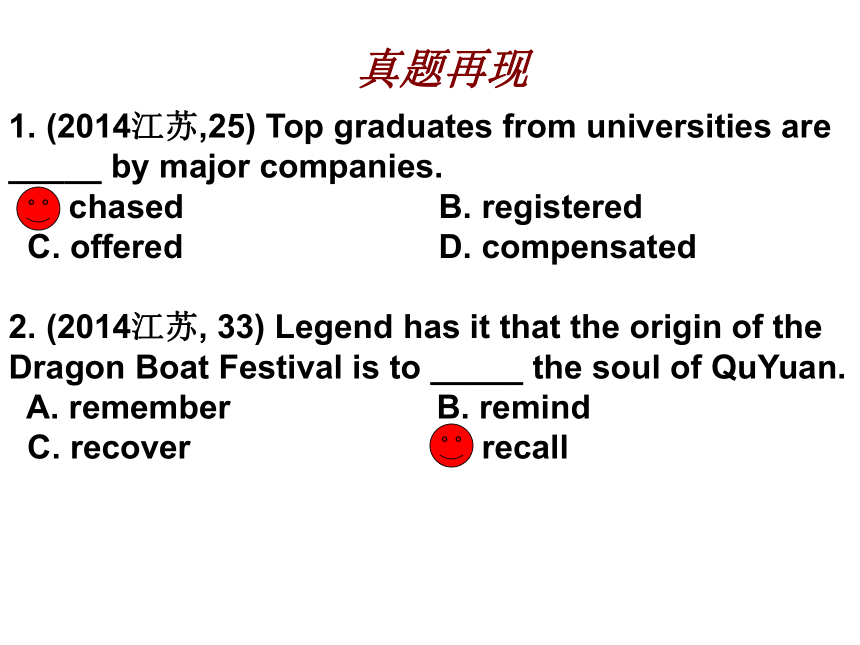
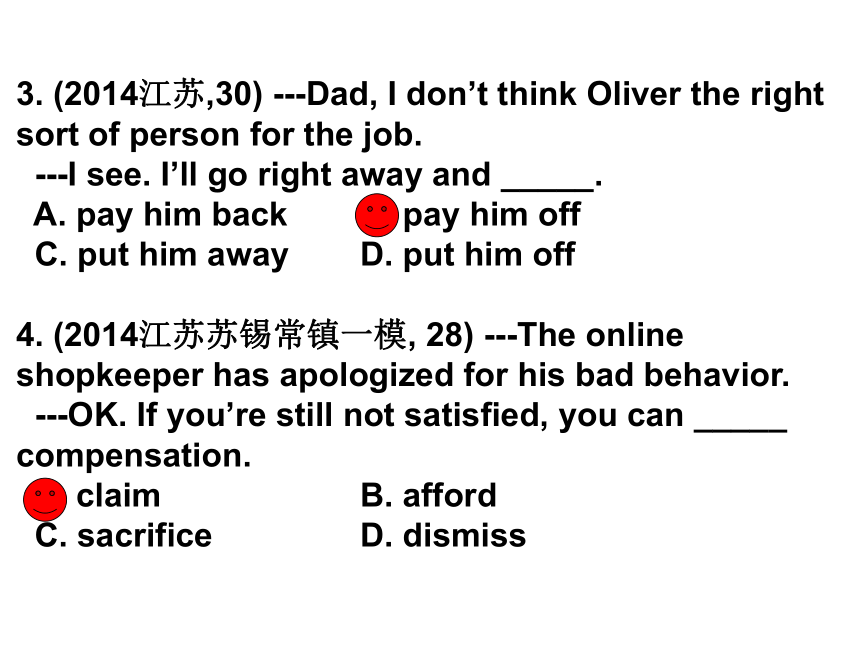
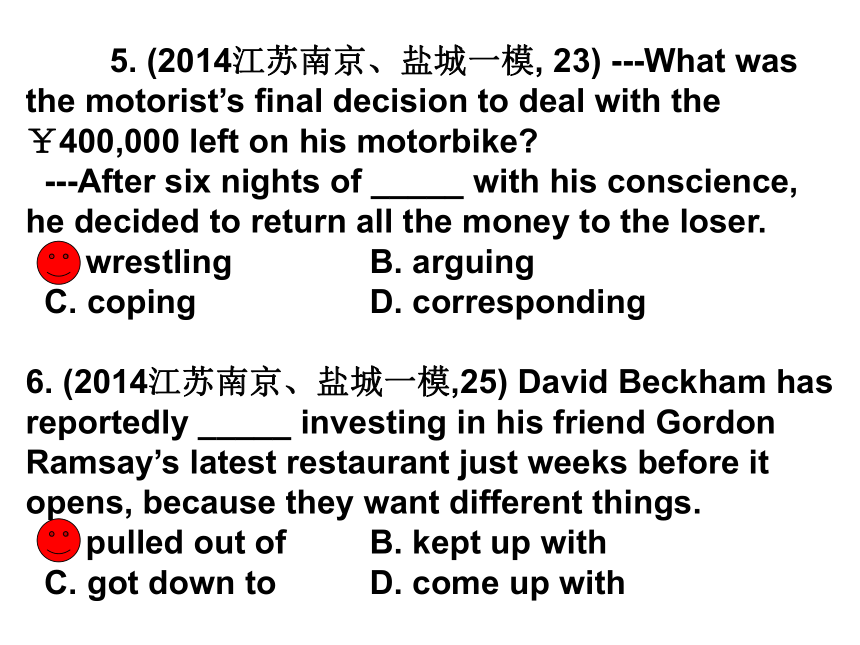
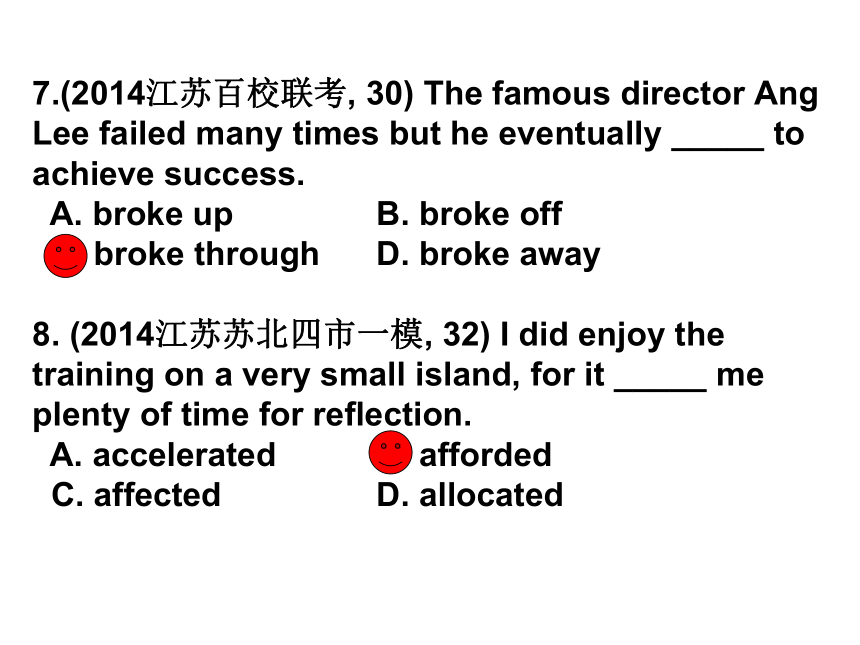
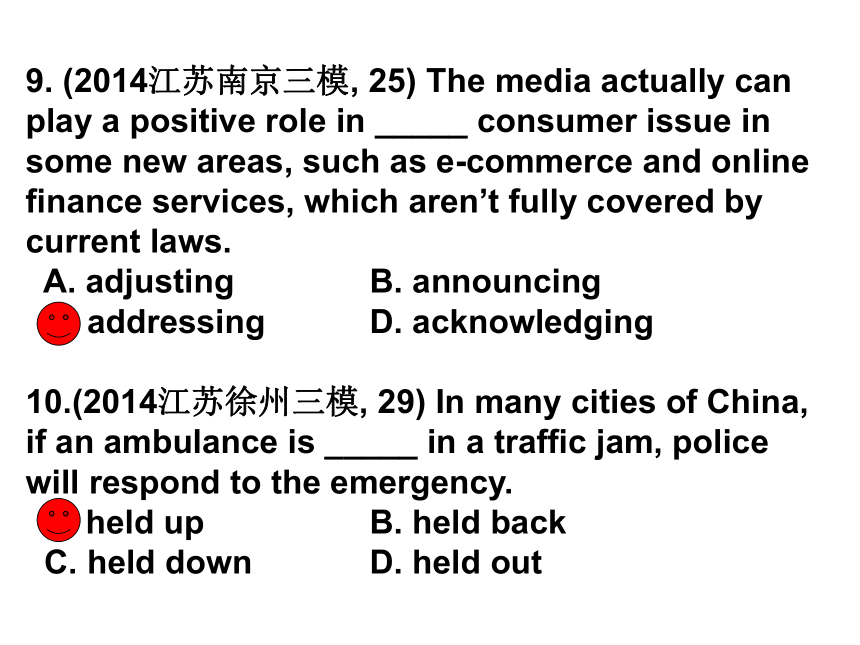
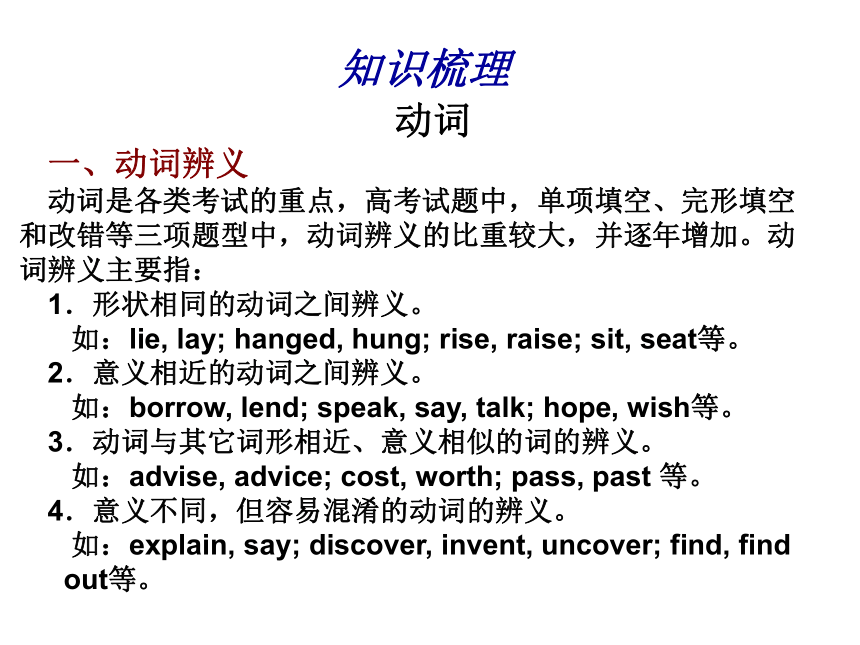
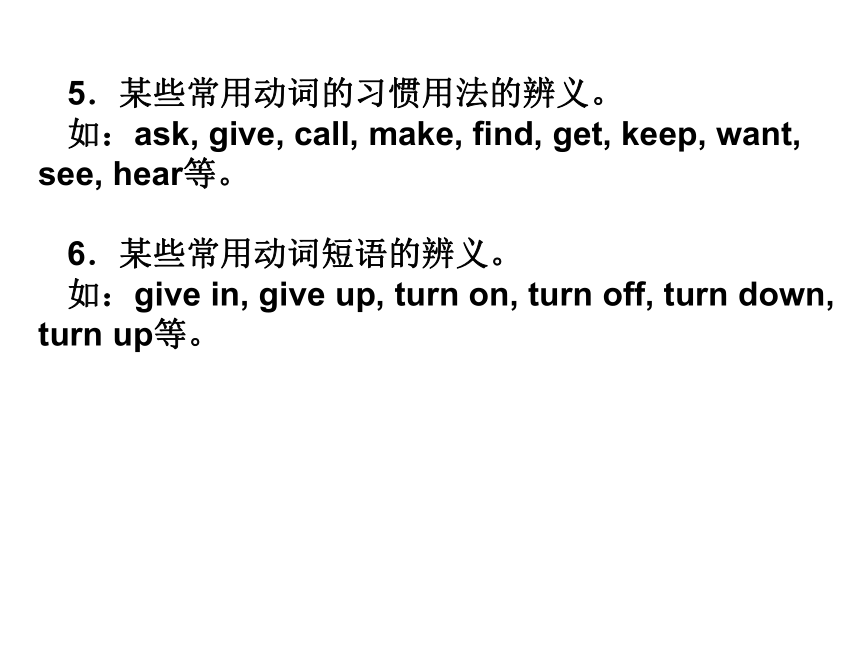
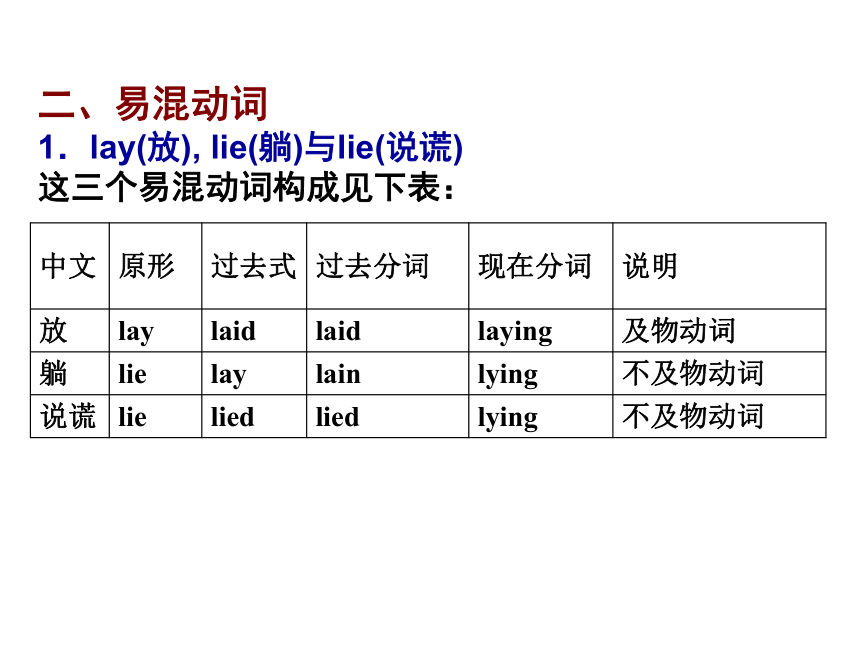
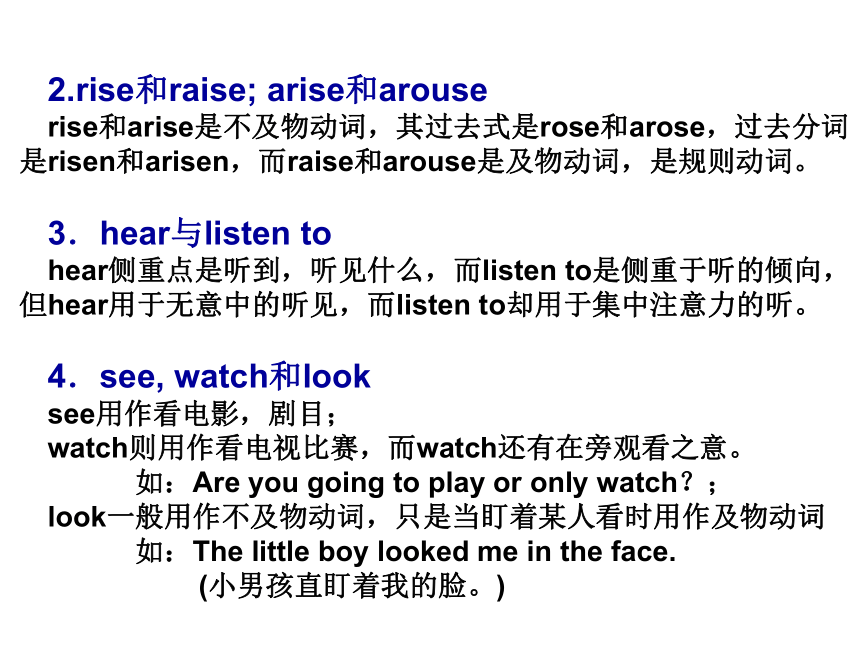

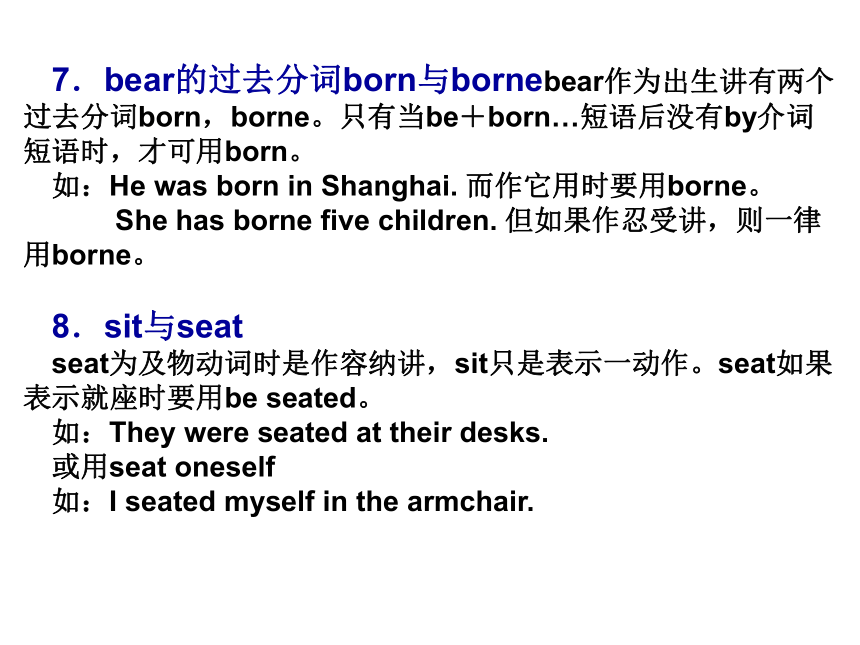
文档简介
课件85张PPT。动词及动词短语1. (2014江苏,25) Top graduates from universities are _____ by major companies.
A. chased B. registered
C. offered D. compensated
2. (2014江苏, 33) Legend has it that the origin of the Dragon Boat Festival is to _____ the soul of QuYuan.
A. remember B. remind
C. recover D. recall真题再现3. (2014江苏,30) ---Dad, I don’t think Oliver the right sort of person for the job.
---I see. I’ll go right away and _____.
A. pay him back B. pay him off
C. put him away D. put him off
4. (2014江苏苏锡常镇一模, 28) ---The online shopkeeper has apologized for his bad behavior.
---OK. If you’re still not satisfied, you can _____ compensation.
A. claim B. afford
C. sacrifice D. dismiss 5. (2014江苏南京、盐城一模, 23) ---What was the motorist’s final decision to deal with the ¥400,000 left on his motorbike?
---After six nights of _____ with his conscience, he decided to return all the money to the loser.
A. wrestling B. arguing
C. coping D. corresponding
6. (2014江苏南京、盐城一模,25) David Beckham has reportedly _____ investing in his friend Gordon Ramsay’s latest restaurant just weeks before it opens, because they want different things.
A. pulled out of B. kept up with
C. got down to D. come up with7.(2014江苏百校联考, 30) The famous director Ang Lee failed many times but he eventually _____ to achieve success.
A. broke up B. broke off
C. broke through D. broke away
8. (2014江苏苏北四市一模, 32) I did enjoy the training on a very small island, for it _____ me plenty of time for reflection.
A. accelerated B. afforded
C. affected D. allocated9. (2014江苏南京三模, 25) The media actually can play a positive role in _____ consumer issue in some new areas, such as e-commerce and online finance services, which aren’t fully covered by current laws.
A. adjusting B. announcing
C. addressing D. acknowledging
10.(2014江苏徐州三模, 29) In many cities of China, if an ambulance is _____ in a traffic jam, police will respond to the emergency.
A. held up B. held back
C. held down D. held out知识梳理动词
一、动词辨义
动词是各类考试的重点,高考试题中,单项填空、完形填空和改错等三项题型中,动词辨义的比重较大,并逐年增加。动词辨义主要指:
1.形状相同的动词之间辨义。
如:lie, lay; hanged, hung; rise, raise; sit, seat等。
2.意义相近的动词之间辨义。
如:borrow, lend; speak, say, talk; hope, wish等。
3.动词与其它词形相近、意义相似的词的辨义。
如:advise, advice; cost, worth; pass, past 等。
4.意义不同,但容易混淆的动词的辨义。
如:explain, say; discover, invent, uncover; find, find
out等。5.某些常用动词的习惯用法的辨义。
如:ask, give, call, make, find, get, keep, want, see, hear等。
6.某些常用动词短语的辨义。
如:give in, give up, turn on, turn off, turn down, turn up等。二、易混动词
1.lay(放), lie(躺)与lie(说谎)
这三个易混动词构成见下表:2.rise和raise; arise和arouse
rise和arise是不及物动词,其过去式是rose和arose,过去分词是risen和arisen,而raise和arouse是及物动词,是规则动词。
3.hear与listen to
hear侧重点是听到,听见什么,而listen to是侧重于听的倾向,但hear用于无意中的听见,而listen to却用于集中注意力的听。
4.see, watch和look
see用作看电影,剧目;
watch则用作看电视比赛,而watch还有在旁观看之意。
如:Are you going to play or only watch?;
look一般用作不及物动词,只是当盯着某人看时用作及物动词
如:The little boy looked me in the face.
(小男孩直盯着我的脸。)5.wind和wound
wind意为蜿蜒而行,其过去式与过去分词都是wound,而动词原形wound意为伤害,其过去式、过去分词都是wounded。
6.hang的用法
hang有两个意思:一为悬挂,是不规则动词,过去式、过去分词都是hung;二为绞刑,是规则动词,其过去式、过去分词都是hanged。7.bear的过去分词born与bornebear作为出生讲有两个过去分词born,borne。只有当be+born…短语后没有by介词短语时,才可用born。
如:He was born in Shanghai. 而作它用时要用borne。
She has borne five children. 但如果作忍受讲,则一律用borne。
8.sit与seat
seat为及物动词时是作容纳讲,sit只是表示一动作。seat如果表示就座时要用be seated。
如:They were seated at their desks.
或用seat oneself
如:I seated myself in the armchair.9.borrow, lend与keep
借入英文中用borrow,借出用lend,但这两个词都是终止性动词或瞬间动词,不能用于长时间的动作,所以我能借多久应用keep。
10.win与beat
win作胜、赢讲时其后应接a game, an argument, a battle, a prize, a contest, a race, a bet,但不能接人,如果接人则有另外的含意。如:I have won him. 即我已说服他了,我赢得他的好感。而beat是及物动词为击败、胜过讲,直接接人、队。11.steal与rob
steal为偷,rob为抢,其用法不同。steal其后接物+from+某人、某地,而rob其后接人+of+抢的物品。
12.fit与suit
fit与suit均可作合适讲,但英文中却用在不同的地方。如fit用于尺寸大小的合适,而suit则多用于颜色式样的合适。
13.take, bring 与fetch
英文中拿三个词,即拿来,拿去,去取然后回来(即双程)。所以拿来,带来是bring,拿去带走是take,而去取回来是fetch。14.shut与close
shut与close有时是可以互换的,但有些地方则不可这样做。如:在正式场合多用close,而在命令,态度粗暴的场合则用shut。如:Shut your mouth!(闭嘴);又如:Shut up. 在指铁路、公路交通关闭或停止使用的场合,则要用close。
15.answer与reply
作为回答讲answer是及物动词,如作不及物动词,则意义不同,如answer for,意为向某人或向某事负责。而reply作回答讲是不及物动词,后跟宾语时,要加上to。16.reach,arrive与get to
reach当到达讲是及物动词,而当延伸和拿得到、拿不到讲时,则是不及物动词。作到达讲时还有get to, arrive (at/in)。
17.cost,spend与take
英文中花费有三个词cost, spend, take,但各有不同用法。cost作“花费”讲,主语不能是人,而spend的主语不能是物。如: she spent all his money on stamps.而take作花费讲时,可用人也可用物做主语。更多的用法是用形式主语it,如It takes me three hours to finish this work.18.lost, gone与missing
作补足语时意为丢失、不见了,可以用lost, gone,但要用 miss时则不能用missed, 而要用missing.
19.have on, wear, put on及dress
作穿衣服讲的动词分为状态和动作两种。have on与wear作穿着状态讲;但have on不用进行时态,而wear则常要用进行时态。put on是动作,但dress既可用作状态,又可用作穿衣动作,但用作状态时要用其过去分词作形容词如:He was dressed in a blue suit作动作讲时,其后不要接衣物而要接反身代词或表示人、物的名词,如:I dress my children in the morning every day.20.begin与start
begin与start 均可作开始讲,并无多少区别,同样可接不定式或动名词,但在下面的场合多要用start:1)机器的开动发动;2)旅途的开始。如:We should have to start early because there was a lot of traffic in the street。
21.allow 与permit
allow与permit其后直接接动作时要用动名词,如接人后再接动词则要用不定式,所以用在被动语态时一定要用不定式。如:People are not allowed to spit.22.find与found
find找到的过去式和过去分词都是found,而found是动词“建立”的原形,其过去式和过去分词是founded,founded,如:
The People's Republic of China was founded in 1949.
23.excuse me 与sorry
excuse me用于来打扰对方前以提醒对方注意的提示语,而sorry则表达因做了某事向对方道歉。
24.care for 与care to do
care for其后要接不定式时则要省去for或换用名词,如:Would you care for a cup of tea?但care for作照顾讲时与look after相同。25.speak, say, talk 与tell
英文中讲有4个词,speak, say, talk, tell,但其中speak, talk多用作不及物动词,但speak后加语言名词时则用作及物动词,如:Please speak English。而say与tell是及物动词,其中tell常用作接双宾语,如:Tell me a story。但也有些特定的习惯用法,如:在作讲实话,讲谎言,表示时间常用单宾语而不能换其它词,如:My watch was broken. It couldn't tell time correctly。在书信、便条、海报上写着英文应为It said …。在作辨别不同讲时是tell,如:Can you tell me the difference between the two?而讲别人好坏话时用speak,如:The father always speaks well of his son.。26.与名词易混的动词有:advise (v.), advice (n.); accept (v.), except (prep.); pass (v.), past (prep.); bathe (v.), bath (n.); breathe (v.), breath (n.); choose (v.), choice (n.); succeed (v.), success (n.).
27.意义相近的动词:
ring摇铃,打铃,电话铃响,strike专指敲钟,打几点,撞击;suggest提出实验性或推测性的建议,advice表示对经验不足人的一种忠告;look由视觉得出的印象,seem暗示一定根据的判定,appear外表印象而实际或结果并非如此;stay停留,逗留,remain仍然是,有待于;discover(发现)找到早已存在但未被人所了解的东西,invent(发明)研制出不存在的东西;remember记忆起以前经历或知道的事,remind提醒某人做某事。 28.动词+副词+介词
catch up with, look forward to, come up with, keep up with, go in for, look down on, get on with...
29.动词 + 介词to的词组有
come to, stick to, object to, agree to, turn to, attend to, belong to, devote to, reply to...
30.与in相结合的动词有
give in, hand in, bring in, drop in, succeed in, take in, check in, engage in, fill in, trade in... 动词短语
一、动词短语知识要点
动词短语是指动词和介词、副词或名词的习惯搭配。有关动词短语的测试点主要涉及结构上选用恰当的搭配词,不同搭配含意上的辨异及不同短语的辨异。需掌握以下要点:1.根据动词短语的不同特点,掌握其运用规律。
(1)动词+副词(不及物)
Harry turned up after the party when everyone had left.
晚会后,人们都已离去,哈里出现了。
(2)动词+副词(及物)
Please turn every light in the house off.
请把房子里的每一盏灯都关掉。
注意:①如果宾语较长,就应避免把副词同动词分开。如:She turned off all the lights which had been left on. 她关掉了所有还在亮着的灯。②如果宾语是人称代词,只能放在动词和副词之间。
如:She gave them away. 她送掉了它们。(3)动词+介词(及物)
I'm looking for my glasses.
我在找我的眼镜。
注意:①当它跟宾语时,不能把介词放在宾语后面。②动词短语可以放在句子或从句末尾。如:She's got more work than she can cope with. 她的工作多得使她应付不了。(4)动词+副词+介词
I look forward to seeing you soon.
我盼望不久就见到你。
注意:“动词+介词”、“动词+名词+副词”、“动词+副词+介词”,这三种搭配都是及物的,如变成被动语态,不可漏掉介词。In this way both grain and vegetable can be well looked after. (不能漏掉after) 这样一来,粮食和蔬菜都能兼顾了。2.熟悉同一动词和不同介词或副词、不同的动词和同一介词或同一副词搭配在意义上的差异。
(1)同一动词和不同介词搭配时,意义上的差异。
如:①hear from收到……的来信,hear of听说。
②look after照料,look at看,look for寻找。(4)不同动词和同一副词搭配时,在意义上的差异。如:①break out发生,爆发, carry out进行,开展, go out熄灭, hand out分发, let out放出, look out当心, sell out卖完, set out出发, take out取出, work out算出。②break down出毛病, come down落下来, get down下车, take down取下, write down写下。(2)同一动词和不同副词搭配时,意义上的差异。
如:①ring back回电话, ring off挂断电话, ring up打电话 ②put away放好, put on穿上,上演, put up挂起,举起。
(3)不同动词和同一介词搭配时,在意义上的差异。
如:look for寻找, call for去取(某物),去接(某人), ask for请求, wait for等候, send for派人去叫。二、动词短语实战分析
动词短语是历年高考考查的一个热点,每年必考。在每年的单项填空题15道题中至少有一道题测试动词短语,而且呈增长的趋势。设题时往往都是给出四个不同的动词短语来测试考生在具体语境中对动词短语意义的理解和运用能力。动词短语考查面广,灵活度强,在历年高考题模拟题中倍受青睐。[即时训练1] Some of the students have already learned enough English to ________ a conversation with a native English speaker.
A. hold on B. keep on
C. go on D. carry on
【解题关键】解答该题的关键是不仅要理解供选择的四个动词短语的意义,而且要结合题干中的名词与动词短语的关系来进行判断选择。
【解析】选项A、B、C三个动词短语都表示“继续”之意,与题干中名词a conversation with a native English speaker构成短语,不符句意。故选D项。[即时训练2] You'd better fly somewhere in the west. Then you can ________ a hire car and travel around.
A. take up B. get on
C. pick up D. turn on
【解题关键】解答该题的关键是根据所给动词短语的意思,结合题干句作出正确选择。
【解析】take up开始学,从事,占去; get on 上(车),相处,进展; pick up 拾起,学会,收听,搭车;turn on打开。根据句子意思,应选择pick up,搭乘出租车。故选C项。[即时训练3] We've invited Mr. and Mrs. Brown to dinner. But we'll have to ________ because of the baby's sickness.
A. took up B. made up
C. gave up D. put off
【解题关键】解答该题的关键是注意区别give up与put off的差异。
【解析】根据句子意思,首先排除选项A开始学,从事,占去;B组成,构成;而选项C (give up放弃)强调主观意义,不符句子意思,故应选put off(推迟)。故选D项。[即时训练5] The actress who had been thought highly of ________ to be a great disappointment.
A. turned up B. turned out
C. turned down D. turned in
【解题关键】解答该题的关键是理解句意:区别四个由动词turn所构成的短语意义,作出正确选择。
【解析】turn up调大(音量),出现;turn out结果是,证明是,生产,制造; turn down调低,拒绝;turn in交上去。故选B项。[即时训练4] They have ________ most carefully the time and money needed to complete the project.
A. picked out B. left out
C. figured out D. taken out
【解题关键】由于选项B、C两个动词短语为不常见短语,意义生疏,故解题时必须根据题干句子意思进行排除选择。
【解析】pick out挑出,选出; leave out 漏掉;figure out算出; take out拿出,取出。根据句子意思:他们十分仔细地算出了完成工程所需要的钱和时间,故
应选C项。[即时训练6] —It's a good idea. But who's going to _____ the plan?
—I think Tom and Mike will.
A. carry out B. get through
C. take in D. set aside
【解题关键】该题提供的四个短语意义较广,解答该题的关键必须结合句子意思进行排除从而得出正确答案。
【解析】carry out执行,实行;get through完成,度过,通过;take in吸收,领会; set aside不理会,搁置。根据句子的意思:这是一个好主意, 但谁去执行
这个计划呢?故选A项。[即时训练8] Without proper lessons, you could ________ a lot of bad habits when playing the piano.
A. give up B. catch up
C. keep up D. pick up
【解题关键】解答该题的关键是要注意短语pick up的意义及题干句意的理解。
【解析】give up放弃;catch up赶上; keep up维持; pick up学会,搭车,拾起,收听到,无意中得到。根据句子的意思:如果没有正确的指导,弹钢琴时就会
染上许多坏习惯。故选D项。[即时训练7] Most people didn't accept the theory when it was first ________.
A. set about B. set off
C. put forward D. put out
【解题关键】解答该题的关键是结合句子的意思将短语代入,采用排除法进行选择,注意句子的意思与选项动词短语的意义一致。
【解析】set about 着手;set off出发,激发; put forward提出; put out扑灭。句意为:当这个理论最初被提出时,绝大多数人不能接受。故选C项。Thank you!
A. chased B. registered
C. offered D. compensated
2. (2014江苏, 33) Legend has it that the origin of the Dragon Boat Festival is to _____ the soul of QuYuan.
A. remember B. remind
C. recover D. recall真题再现3. (2014江苏,30) ---Dad, I don’t think Oliver the right sort of person for the job.
---I see. I’ll go right away and _____.
A. pay him back B. pay him off
C. put him away D. put him off
4. (2014江苏苏锡常镇一模, 28) ---The online shopkeeper has apologized for his bad behavior.
---OK. If you’re still not satisfied, you can _____ compensation.
A. claim B. afford
C. sacrifice D. dismiss 5. (2014江苏南京、盐城一模, 23) ---What was the motorist’s final decision to deal with the ¥400,000 left on his motorbike?
---After six nights of _____ with his conscience, he decided to return all the money to the loser.
A. wrestling B. arguing
C. coping D. corresponding
6. (2014江苏南京、盐城一模,25) David Beckham has reportedly _____ investing in his friend Gordon Ramsay’s latest restaurant just weeks before it opens, because they want different things.
A. pulled out of B. kept up with
C. got down to D. come up with7.(2014江苏百校联考, 30) The famous director Ang Lee failed many times but he eventually _____ to achieve success.
A. broke up B. broke off
C. broke through D. broke away
8. (2014江苏苏北四市一模, 32) I did enjoy the training on a very small island, for it _____ me plenty of time for reflection.
A. accelerated B. afforded
C. affected D. allocated9. (2014江苏南京三模, 25) The media actually can play a positive role in _____ consumer issue in some new areas, such as e-commerce and online finance services, which aren’t fully covered by current laws.
A. adjusting B. announcing
C. addressing D. acknowledging
10.(2014江苏徐州三模, 29) In many cities of China, if an ambulance is _____ in a traffic jam, police will respond to the emergency.
A. held up B. held back
C. held down D. held out知识梳理动词
一、动词辨义
动词是各类考试的重点,高考试题中,单项填空、完形填空和改错等三项题型中,动词辨义的比重较大,并逐年增加。动词辨义主要指:
1.形状相同的动词之间辨义。
如:lie, lay; hanged, hung; rise, raise; sit, seat等。
2.意义相近的动词之间辨义。
如:borrow, lend; speak, say, talk; hope, wish等。
3.动词与其它词形相近、意义相似的词的辨义。
如:advise, advice; cost, worth; pass, past 等。
4.意义不同,但容易混淆的动词的辨义。
如:explain, say; discover, invent, uncover; find, find
out等。5.某些常用动词的习惯用法的辨义。
如:ask, give, call, make, find, get, keep, want, see, hear等。
6.某些常用动词短语的辨义。
如:give in, give up, turn on, turn off, turn down, turn up等。二、易混动词
1.lay(放), lie(躺)与lie(说谎)
这三个易混动词构成见下表:2.rise和raise; arise和arouse
rise和arise是不及物动词,其过去式是rose和arose,过去分词是risen和arisen,而raise和arouse是及物动词,是规则动词。
3.hear与listen to
hear侧重点是听到,听见什么,而listen to是侧重于听的倾向,但hear用于无意中的听见,而listen to却用于集中注意力的听。
4.see, watch和look
see用作看电影,剧目;
watch则用作看电视比赛,而watch还有在旁观看之意。
如:Are you going to play or only watch?;
look一般用作不及物动词,只是当盯着某人看时用作及物动词
如:The little boy looked me in the face.
(小男孩直盯着我的脸。)5.wind和wound
wind意为蜿蜒而行,其过去式与过去分词都是wound,而动词原形wound意为伤害,其过去式、过去分词都是wounded。
6.hang的用法
hang有两个意思:一为悬挂,是不规则动词,过去式、过去分词都是hung;二为绞刑,是规则动词,其过去式、过去分词都是hanged。7.bear的过去分词born与bornebear作为出生讲有两个过去分词born,borne。只有当be+born…短语后没有by介词短语时,才可用born。
如:He was born in Shanghai. 而作它用时要用borne。
She has borne five children. 但如果作忍受讲,则一律用borne。
8.sit与seat
seat为及物动词时是作容纳讲,sit只是表示一动作。seat如果表示就座时要用be seated。
如:They were seated at their desks.
或用seat oneself
如:I seated myself in the armchair.9.borrow, lend与keep
借入英文中用borrow,借出用lend,但这两个词都是终止性动词或瞬间动词,不能用于长时间的动作,所以我能借多久应用keep。
10.win与beat
win作胜、赢讲时其后应接a game, an argument, a battle, a prize, a contest, a race, a bet,但不能接人,如果接人则有另外的含意。如:I have won him. 即我已说服他了,我赢得他的好感。而beat是及物动词为击败、胜过讲,直接接人、队。11.steal与rob
steal为偷,rob为抢,其用法不同。steal其后接物+from+某人、某地,而rob其后接人+of+抢的物品。
12.fit与suit
fit与suit均可作合适讲,但英文中却用在不同的地方。如fit用于尺寸大小的合适,而suit则多用于颜色式样的合适。
13.take, bring 与fetch
英文中拿三个词,即拿来,拿去,去取然后回来(即双程)。所以拿来,带来是bring,拿去带走是take,而去取回来是fetch。14.shut与close
shut与close有时是可以互换的,但有些地方则不可这样做。如:在正式场合多用close,而在命令,态度粗暴的场合则用shut。如:Shut your mouth!(闭嘴);又如:Shut up. 在指铁路、公路交通关闭或停止使用的场合,则要用close。
15.answer与reply
作为回答讲answer是及物动词,如作不及物动词,则意义不同,如answer for,意为向某人或向某事负责。而reply作回答讲是不及物动词,后跟宾语时,要加上to。16.reach,arrive与get to
reach当到达讲是及物动词,而当延伸和拿得到、拿不到讲时,则是不及物动词。作到达讲时还有get to, arrive (at/in)。
17.cost,spend与take
英文中花费有三个词cost, spend, take,但各有不同用法。cost作“花费”讲,主语不能是人,而spend的主语不能是物。如: she spent all his money on stamps.而take作花费讲时,可用人也可用物做主语。更多的用法是用形式主语it,如It takes me three hours to finish this work.18.lost, gone与missing
作补足语时意为丢失、不见了,可以用lost, gone,但要用 miss时则不能用missed, 而要用missing.
19.have on, wear, put on及dress
作穿衣服讲的动词分为状态和动作两种。have on与wear作穿着状态讲;但have on不用进行时态,而wear则常要用进行时态。put on是动作,但dress既可用作状态,又可用作穿衣动作,但用作状态时要用其过去分词作形容词如:He was dressed in a blue suit作动作讲时,其后不要接衣物而要接反身代词或表示人、物的名词,如:I dress my children in the morning every day.20.begin与start
begin与start 均可作开始讲,并无多少区别,同样可接不定式或动名词,但在下面的场合多要用start:1)机器的开动发动;2)旅途的开始。如:We should have to start early because there was a lot of traffic in the street。
21.allow 与permit
allow与permit其后直接接动作时要用动名词,如接人后再接动词则要用不定式,所以用在被动语态时一定要用不定式。如:People are not allowed to spit.22.find与found
find找到的过去式和过去分词都是found,而found是动词“建立”的原形,其过去式和过去分词是founded,founded,如:
The People's Republic of China was founded in 1949.
23.excuse me 与sorry
excuse me用于来打扰对方前以提醒对方注意的提示语,而sorry则表达因做了某事向对方道歉。
24.care for 与care to do
care for其后要接不定式时则要省去for或换用名词,如:Would you care for a cup of tea?但care for作照顾讲时与look after相同。25.speak, say, talk 与tell
英文中讲有4个词,speak, say, talk, tell,但其中speak, talk多用作不及物动词,但speak后加语言名词时则用作及物动词,如:Please speak English。而say与tell是及物动词,其中tell常用作接双宾语,如:Tell me a story。但也有些特定的习惯用法,如:在作讲实话,讲谎言,表示时间常用单宾语而不能换其它词,如:My watch was broken. It couldn't tell time correctly。在书信、便条、海报上写着英文应为It said …。在作辨别不同讲时是tell,如:Can you tell me the difference between the two?而讲别人好坏话时用speak,如:The father always speaks well of his son.。26.与名词易混的动词有:advise (v.), advice (n.); accept (v.), except (prep.); pass (v.), past (prep.); bathe (v.), bath (n.); breathe (v.), breath (n.); choose (v.), choice (n.); succeed (v.), success (n.).
27.意义相近的动词:
ring摇铃,打铃,电话铃响,strike专指敲钟,打几点,撞击;suggest提出实验性或推测性的建议,advice表示对经验不足人的一种忠告;look由视觉得出的印象,seem暗示一定根据的判定,appear外表印象而实际或结果并非如此;stay停留,逗留,remain仍然是,有待于;discover(发现)找到早已存在但未被人所了解的东西,invent(发明)研制出不存在的东西;remember记忆起以前经历或知道的事,remind提醒某人做某事。 28.动词+副词+介词
catch up with, look forward to, come up with, keep up with, go in for, look down on, get on with...
29.动词 + 介词to的词组有
come to, stick to, object to, agree to, turn to, attend to, belong to, devote to, reply to...
30.与in相结合的动词有
give in, hand in, bring in, drop in, succeed in, take in, check in, engage in, fill in, trade in... 动词短语
一、动词短语知识要点
动词短语是指动词和介词、副词或名词的习惯搭配。有关动词短语的测试点主要涉及结构上选用恰当的搭配词,不同搭配含意上的辨异及不同短语的辨异。需掌握以下要点:1.根据动词短语的不同特点,掌握其运用规律。
(1)动词+副词(不及物)
Harry turned up after the party when everyone had left.
晚会后,人们都已离去,哈里出现了。
(2)动词+副词(及物)
Please turn every light in the house off.
请把房子里的每一盏灯都关掉。
注意:①如果宾语较长,就应避免把副词同动词分开。如:She turned off all the lights which had been left on. 她关掉了所有还在亮着的灯。②如果宾语是人称代词,只能放在动词和副词之间。
如:She gave them away. 她送掉了它们。(3)动词+介词(及物)
I'm looking for my glasses.
我在找我的眼镜。
注意:①当它跟宾语时,不能把介词放在宾语后面。②动词短语可以放在句子或从句末尾。如:She's got more work than she can cope with. 她的工作多得使她应付不了。(4)动词+副词+介词
I look forward to seeing you soon.
我盼望不久就见到你。
注意:“动词+介词”、“动词+名词+副词”、“动词+副词+介词”,这三种搭配都是及物的,如变成被动语态,不可漏掉介词。In this way both grain and vegetable can be well looked after. (不能漏掉after) 这样一来,粮食和蔬菜都能兼顾了。2.熟悉同一动词和不同介词或副词、不同的动词和同一介词或同一副词搭配在意义上的差异。
(1)同一动词和不同介词搭配时,意义上的差异。
如:①hear from收到……的来信,hear of听说。
②look after照料,look at看,look for寻找。(4)不同动词和同一副词搭配时,在意义上的差异。如:①break out发生,爆发, carry out进行,开展, go out熄灭, hand out分发, let out放出, look out当心, sell out卖完, set out出发, take out取出, work out算出。②break down出毛病, come down落下来, get down下车, take down取下, write down写下。(2)同一动词和不同副词搭配时,意义上的差异。
如:①ring back回电话, ring off挂断电话, ring up打电话 ②put away放好, put on穿上,上演, put up挂起,举起。
(3)不同动词和同一介词搭配时,在意义上的差异。
如:look for寻找, call for去取(某物),去接(某人), ask for请求, wait for等候, send for派人去叫。二、动词短语实战分析
动词短语是历年高考考查的一个热点,每年必考。在每年的单项填空题15道题中至少有一道题测试动词短语,而且呈增长的趋势。设题时往往都是给出四个不同的动词短语来测试考生在具体语境中对动词短语意义的理解和运用能力。动词短语考查面广,灵活度强,在历年高考题模拟题中倍受青睐。[即时训练1] Some of the students have already learned enough English to ________ a conversation with a native English speaker.
A. hold on B. keep on
C. go on D. carry on
【解题关键】解答该题的关键是不仅要理解供选择的四个动词短语的意义,而且要结合题干中的名词与动词短语的关系来进行判断选择。
【解析】选项A、B、C三个动词短语都表示“继续”之意,与题干中名词a conversation with a native English speaker构成短语,不符句意。故选D项。[即时训练2] You'd better fly somewhere in the west. Then you can ________ a hire car and travel around.
A. take up B. get on
C. pick up D. turn on
【解题关键】解答该题的关键是根据所给动词短语的意思,结合题干句作出正确选择。
【解析】take up开始学,从事,占去; get on 上(车),相处,进展; pick up 拾起,学会,收听,搭车;turn on打开。根据句子意思,应选择pick up,搭乘出租车。故选C项。[即时训练3] We've invited Mr. and Mrs. Brown to dinner. But we'll have to ________ because of the baby's sickness.
A. took up B. made up
C. gave up D. put off
【解题关键】解答该题的关键是注意区别give up与put off的差异。
【解析】根据句子意思,首先排除选项A开始学,从事,占去;B组成,构成;而选项C (give up放弃)强调主观意义,不符句子意思,故应选put off(推迟)。故选D项。[即时训练5] The actress who had been thought highly of ________ to be a great disappointment.
A. turned up B. turned out
C. turned down D. turned in
【解题关键】解答该题的关键是理解句意:区别四个由动词turn所构成的短语意义,作出正确选择。
【解析】turn up调大(音量),出现;turn out结果是,证明是,生产,制造; turn down调低,拒绝;turn in交上去。故选B项。[即时训练4] They have ________ most carefully the time and money needed to complete the project.
A. picked out B. left out
C. figured out D. taken out
【解题关键】由于选项B、C两个动词短语为不常见短语,意义生疏,故解题时必须根据题干句子意思进行排除选择。
【解析】pick out挑出,选出; leave out 漏掉;figure out算出; take out拿出,取出。根据句子意思:他们十分仔细地算出了完成工程所需要的钱和时间,故
应选C项。[即时训练6] —It's a good idea. But who's going to _____ the plan?
—I think Tom and Mike will.
A. carry out B. get through
C. take in D. set aside
【解题关键】该题提供的四个短语意义较广,解答该题的关键必须结合句子意思进行排除从而得出正确答案。
【解析】carry out执行,实行;get through完成,度过,通过;take in吸收,领会; set aside不理会,搁置。根据句子的意思:这是一个好主意, 但谁去执行
这个计划呢?故选A项。[即时训练8] Without proper lessons, you could ________ a lot of bad habits when playing the piano.
A. give up B. catch up
C. keep up D. pick up
【解题关键】解答该题的关键是要注意短语pick up的意义及题干句意的理解。
【解析】give up放弃;catch up赶上; keep up维持; pick up学会,搭车,拾起,收听到,无意中得到。根据句子的意思:如果没有正确的指导,弹钢琴时就会
染上许多坏习惯。故选D项。[即时训练7] Most people didn't accept the theory when it was first ________.
A. set about B. set off
C. put forward D. put out
【解题关键】解答该题的关键是结合句子的意思将短语代入,采用排除法进行选择,注意句子的意思与选项动词短语的意义一致。
【解析】set about 着手;set off出发,激发; put forward提出; put out扑灭。句意为:当这个理论最初被提出时,绝大多数人不能接受。故选C项。Thank you!
